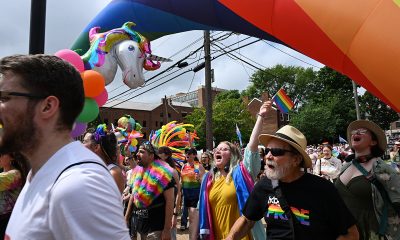homepage news
Top 10 local news stories of 2019
Shocking violence targeting LGBTQ people in D.C. tops our list
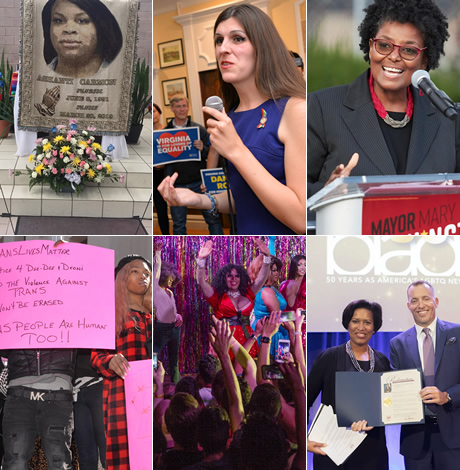
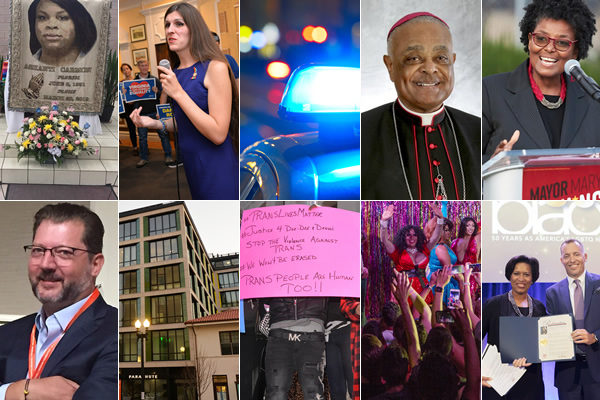
We promise to stop writing about ourselves in 2020 after spending much of last year celebrating the Washington Blade’s milestone 50th anniversary. But we are including that event in this roundup of 2019’s top local news stories:
No. 10 Blade celebrates 50th anniversary
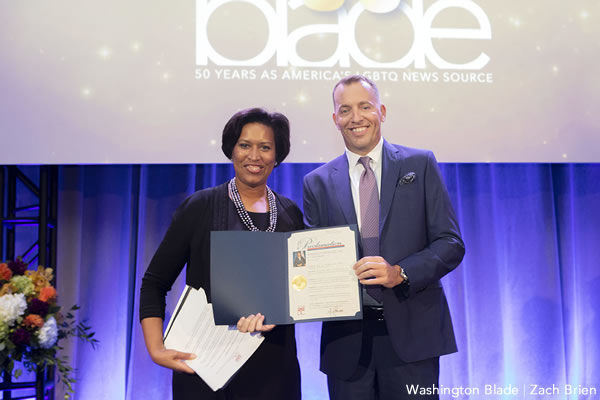
The Washington Blade on Oct. 18 celebrated the 50 anniversary of its founding in 1969 at a gala dinner at the Intercontinental Hotel at the Wharf in Southwest D.C.
A number of prominent activists and public officials joined the Blade’s staff and contributors at the celebration, including D.C. Mayor Muriel Bowser, who issued a proclamation declaring Oct. 18, 2019 Washington Blade Day. Also attending and speaking at the event was U.S. Rep. David Cicilline (D-R.I.), the senior openly gay member of the U.S. House of Representatives.
Broadway star Frenchie Davis sang at the gala event as did the singing ensemble Potomac Fever, which is part of the Gay Men’s Chorus of Washington, D.C.
Through exhibits and a presentation at the gala and throughout the year in its weekly editions and on its website the Blade has highlighted aspects of its 50-year history of covering the LGBTQQ community, the LGBTQ rights movement and the societal changes surrounding the rights of LGBTQQ people in the metro D.C. area, nationally and internationally.
No. 9 Town nightclub plans to reopen in former D.C. church
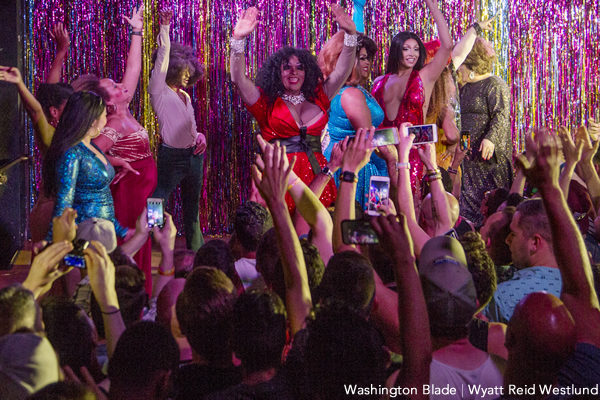
Owners of the former LGBTQ nightclub Town Danceboutique announced in August plans to reopen under the tentative name of Town 2.0 in a former church on North Capitol Street about a half-mile north of the U.S. Capitol.
The announcement came a little over a year after the popular club closed its location at 8th Street and Florida Avenue, N.W. where it operated for more than 10 years when the building it rented was sold to a developer that has since demolished it to build an apartment complex.
“After two full years of searching for a potential new space for a nightclub for the LGBTQ community, we are excited to confirm that we have found a space that has remarkable potential,” the Town owners said in a statement in August. But about two months later, opposition surfaced to the plans for a nightclub in the former St. James Baptist Church by the owners and tenants at an apartment building that abuts the former church.
Observers say Town made a strong case for how it will soundproof the church building to prevent noise from reaching the apartment building and its residents at a Dec. 4 hearing before the D.C. Alcoholic Beverage Control Board, which is expected to decide on whether to approve a license to allow Town to open in the church building sometime within 90 days of the December hearing.
No. 8 Deadlocked jury in trial of men charged in trans murder
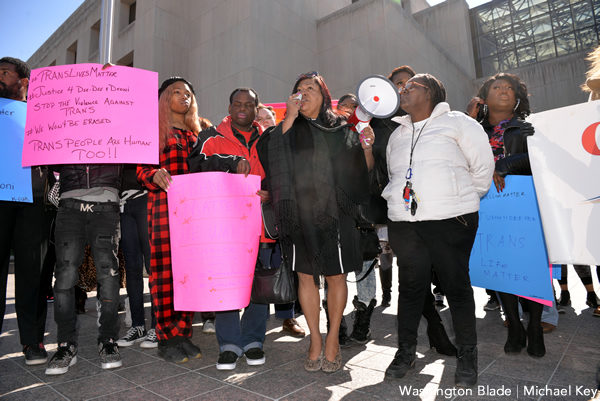
A D.C. Superior Court judge in April agreed to a request by prosecutors to schedule a second trial for two men charged with the July 4, 2016 murder of D.C. transgender woman Deeniquia “Dee Dee” Dodds.
The decision by Judge Milton C. Lee to schedule a new trial, initially set for Feb. 25, 2020 but later changed to June 22, 2020, came one month after the jury in the first trial announced it was deadlocked over the pending charge of first-degree murder while armed against D.C. residents Monte Johnson, 23, and Jolonta Little, 28, prompting Lee to declare a mistrial.
No. 7 Whitman-Walker restructures, opens Liz building
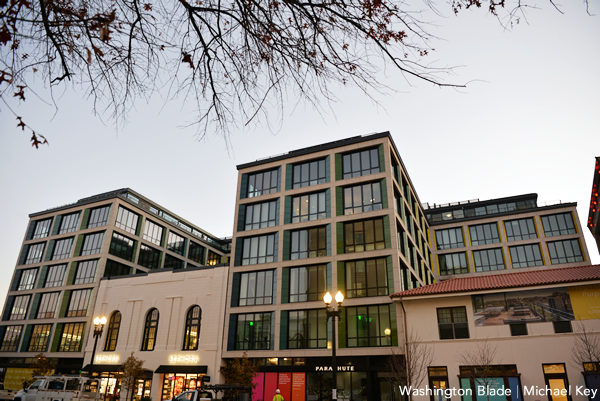
In what it called a newly adopted “shared leadership model,” Whitman-Walker Health announced in January that its then-CEO Don Blanchon would become the founding CEO of a newly created nonprofit entity called Whitman-Walker System.
In the same announcement, Whitman-Walker said its then-Deputy Executive Director Naseema Shafi would replace Blanchon as CEO.
In an open letter to the community, Whitman-Walker said the shared leadership between Blanchon and Shafi was part of a major restructuring of its departments and divisions aimed at strengthening its wide range of healthcare programs and its ability to raise funds to sustain and expand those programs.
One of the endeavors Whitman-Walker officials say the restructuring is intended to bring about was the Nov. 6 official reopening of Whitman-Walker’s Elizabeth Taylor Building at 14th and R streets, N.W. The new six-story, mixed use, multimillion dollar building is part of a joint venture development project that Whitman-Walker entered into with a real estate development company
No. 6 Grosso leads fight to decriminalize sex work in D.C.
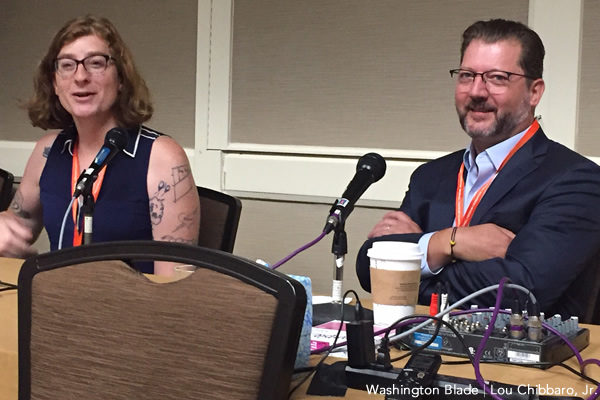
LGBTQ rights advocates were among the strongest supporters of legislation reintroduced in 2019 by D.C. Council member David Grosso (I-At-Large) to decriminalize sex work in D.C.
In his effort to build support for the decriminalization legislation Grosso has pointed out that transgender sex workers have been among those he believes are being harmed by the city’s current laws against prostitution that result in arrests rather than more productive ways to address the issue.
More than 160 witnesses testified for and against Grosso’s bill, the Community Safety and Health Amendment Act of 2019, during a contentious 14-hour D.C. Council hearing in October. There was insufficient consensus and overall support for the bill to bring it up for a vote in the full Council in 2019. Grosso vowed to continue efforts to advocate for the bill in 202
No. 5 Changes in Maryland politics
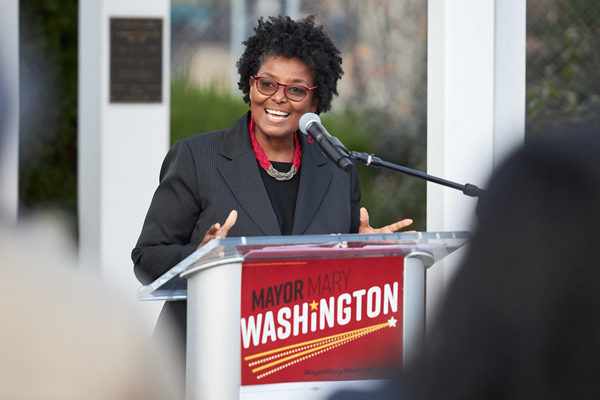
The announcement by lesbian State Sen. Mary Washington (D-Baltimore) that she is a candidate for the office of mayor of Baltimore, the passing of civil rights icon and pro-LGBTQ U.S. Rep. Elijah Cummings (D-Md.), and news that longtime Maryland State Senate President Mike Miller was stepping down from that position after serving for 32 years were among the 2019 developments important to LGBTQ rights advocates in Maryland.
Washington’s announcement that she was entering the Baltimore mayor’s race came one year after she became the first openly LGBTQ person of color to win election to the Maryland Senate. Prior to her 2018 election to the State Senate Washington served in the Maryland House of Delegates since 2011.
Miller is credited with playing an important role in helping to pass LGBTQ rights legislation in Maryland despite his social conservative leanings. Although he said he could not personally support same-sex marriage he allowed legislation legalizing same-sex marriage to advance through the House of Delegates and even took steps to prevent opponents from blocking the bill.
No. 4 New Archbishop of D.C. has pro-LGBTQ record
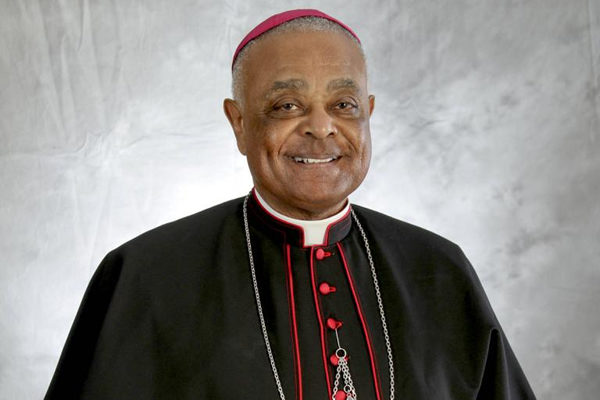
A comment in September by D.C.’s Archbishop Wilton Gregory in support of a transgender man at a public event appeared to confirm the optimism of LGBTQ Catholic activists that he would continue his past policies of welcoming LGBTQ Catholics into the fold of the church.
In April Pope Francis named Gregory, 71, as the new Archbishop of the Archdiocese of Washington, and Gregory was installed into the position on May 21. LGBTQ Catholics familiar with Gregory said he has a record of recognizing and welcoming LGBTQ Catholics during his tenure as Archbishop of Atlanta for the 14 years prior to his appointment as head of the Washington Archdiocese.
No. 3 Report reveals scores of undisclosed D.C. hate crimes
At least eight but probably many more anti-LGBTQ hate crimes took place in D.C. in 2018 that D.C. police and prosecutors didn’t publicly disclose, according to an August 2019 investigative report by the Washington Post.
The post report, which examined police and court records of all 204 incidents designated by D.C. police as hate crimes in 2018, uncovered eight initially undisclosed cases of anti-LGBTQ violence or threats listed by police as hate crimes. One involved a Feb. 2, 2018 incident in which a lesbian was shot in the chest by a co-worker at an outdoor jobsite after the male co-worker harassed her over her sexual orientation.
The Post found that out of the 204 reported hate crime cases in D.C. in 2018, police made an arrest in 59 of those cases involving adults. But the Post found that the U.S. Attorney’s office dropped the hate crime designation in all but three of those cases.
No. 2. Danica Roem re-elected; Dems win control of Va. legislature
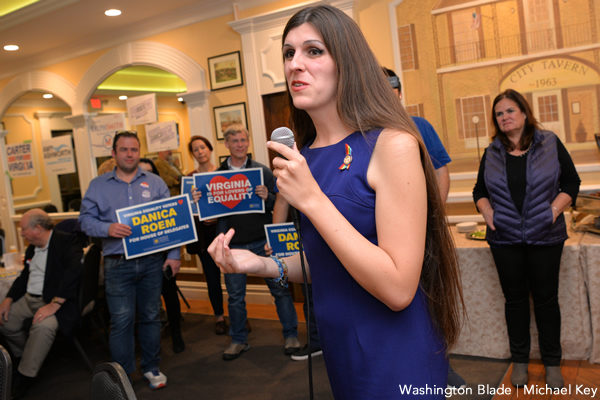
Virginia state Del. Danica Roem (D-Manassas), the first openly transgender person seated in any state legislature in the U.S., won election to a second term on Nov. 5, defeating by a margin of 57-43 percent a Republican opponent who was backed by an anti-LGBTQ organization.
Similar to her first successful election campaign two years earlier, Roem emphasized in her 2019 campaign her support for the expansion of Virginia’s Medicaid program and efforts she has led to reduce traffic congestion on Route 28, a major highway in her district.
An anti-LGBTQ group that supported Roem’s GOP opponent, Kelly McGinn, and the Prince William Republican Committee, attacked Roem based on her gender identity.
In a development that LGBTQ rights advocates in Virginia have called a major breakthrough, Democrats won control of both houses of the Virginia General Assembly in the November election, clearing the way, according to most political observers, for the passage of a statewide LGBTQ rights law in 2020.
No. 1 Record number of violent anti-LGBTQ attacks in D.C.
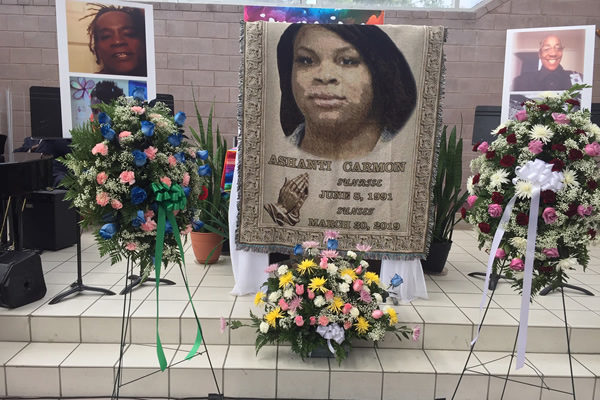
The year 2019 saw what many LGBTQ activists believe to be a record number of violent attacks or threats against LGBTQ people in the D.C. area.
Two transgender women, Ashanti Carmon and Zoe Spears, were shot to death in the same suburban Maryland town of Fairmount Heights just across the D.C. line on March 30 and June 13. A gay man, Vongell Lugo, was stabbed to death in his D.C. apartment on Jan. 6.
There were 13 separate incidents of assaults and robberies of gay men and transgender women in D.C. who police believe were targeted because of their sexual orientation or gender identity.
Prince George’s County police have arrested 33-year-old Geraldo Thomas of Baltimore in the Spears murder and D.C. police have arrested 26-year-old Virginia resident Colin Potter in the Lugo case. Police say they have yet to confirm a motive in both of those cases.
But in nearly all of the 13 assaults and robbery cases, with arrests made in seven of them, D.C. police have listed the incidents as suspected anti-LGBTQ hate crimes. In separate incidents, one on April 15 and the other on June 16 – both in the U Street, N.W. entertainment area where several gay bars are located – a gay male couple was attacked, beaten, and robbed by groups of male suspects who yelled anti-gay slurs.
In the June 16 incident, Braden Brecht, 21, and his boyfriend, Karl Craven, 24, were attacked by a group of more than a dozen male assailants, witnesses told D.C. police, who have arrested two juvenile males and a 19-year-old male in connection with the incident.
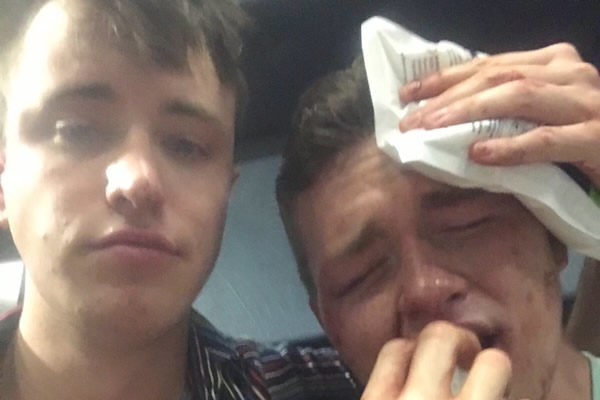
homepage news
Honoring the legacy of New Orleans’ 1973 UpStairs Lounge fire
Why the arson attack that killed 32 gay men still resonates 50 years later

On June 23 of last year, I held the microphone as a gay man in the New Orleans City Council Chamber and related a lost piece of queer history to the seven council members. I told this story to disabuse all New Orleanians of the notion that silence and accommodation, in the face of institutional and official failures, are a path to healing.
The story I related to them began on a typical Sunday night at a second-story bar on the fringe of New Orleans’ French Quarter in 1973, where working-class men would gather around a white baby grand piano and belt out the lyrics to a song that was the anthem of their hidden community, “United We Stand” by the Brotherhood of Man.
“United we stand,” the men would sing together, “divided we fall” — the words epitomizing the ethos of their beloved UpStairs Lounge bar, an egalitarian free space that served as a forerunner to today’s queer safe havens.
Around that piano in the 1970s Deep South, gays and lesbians, white and Black queens, Christians and non-Christians, and even early gender minorities could cast aside the racism, sexism, and homophobia of the times to find acceptance and companionship for a moment.
For regulars, the UpStairs Lounge was a miracle, a small pocket of acceptance in a broader world where their very identities were illegal.
On the Sunday night of June 24, 1973, their voices were silenced in a murderous act of arson that claimed 32 lives and still stands as the deadliest fire in New Orleans history — and the worst mass killing of gays in 20th century America.
As 13 fire companies struggled to douse the inferno, police refused to question the chief suspect, even though gay witnesses identified and brought the soot-covered man to officers idly standing by. This suspect, an internally conflicted gay-for-pay sex worker named Rodger Dale Nunez, had been ejected from the UpStairs Lounge screaming the word “burn” minutes before, but New Orleans police rebuffed the testimony of fire survivors on the street and allowed Nunez to disappear.
As the fire raged, police denigrated the deceased to reporters on the street: “Some thieves hung out there, and you know this was a queer bar.”
For days afterward, the carnage met with official silence. With no local gay political leaders willing to step forward, national Gay Liberation-era figures like Rev. Troy Perry of the Metropolitan Community Church flew in to “help our bereaved brothers and sisters” — and shatter officialdom’s code of silence.
Perry broke local taboos by holding a press conference as an openly gay man. “It’s high time that you people, in New Orleans, Louisiana, got the message and joined the rest of the Union,” Perry said.
Two days later, on June 26, 1973, as families hesitated to step forward to identify their kin in the morgue, UpStairs Lounge owner Phil Esteve stood in his badly charred bar, the air still foul with death. He rebuffed attempts by Perry to turn the fire into a call for visibility and progress for homosexuals.
“This fire had very little to do with the gay movement or with anything gay,” Esteve told a reporter from The Philadelphia Inquirer. “I do not want my bar or this tragedy to be used to further any of their causes.”
Conspicuously, no photos of Esteve appeared in coverage of the UpStairs Lounge fire or its aftermath — and the bar owner also remained silent as he witnessed police looting the ashes of his business.
“Phil said the cash register, juke box, cigarette machine and some wallets had money removed,” recounted Esteve’s friend Bob McAnear, a former U.S. Customs officer. “Phil wouldn’t report it because, if he did, police would never allow him to operate a bar in New Orleans again.”
The next day, gay bar owners, incensed at declining gay bar traffic amid an atmosphere of anxiety, confronted Perry at a clandestine meeting. “How dare you hold your damn news conferences!” one business owner shouted.
Ignoring calls for gay self-censorship, Perry held a 250-person memorial for the fire victims the following Sunday, July 1, culminating in mourners defiantly marching out the front door of a French Quarter church into waiting news cameras. “Reverend Troy Perry awoke several sleeping giants, me being one of them,” recalled Charlene Schneider, a lesbian activist who walked out of that front door with Perry.

Esteve doubted the UpStairs Lounge story’s capacity to rouse gay political fervor. As the coroner buried four of his former patrons anonymously on the edge of town, Esteve quietly collected at least $25,000 in fire insurance proceeds. Less than a year later, he used the money to open another gay bar called the Post Office, where patrons of the UpStairs Lounge — some with visible burn scars — gathered but were discouraged from singing “United We Stand.”
New Orleans cops neglected to question the chief arson suspect and closed the investigation without answers in late August 1973. Gay elites in the city’s power structure began gaslighting the mourners who marched with Perry into the news cameras, casting suspicion on their memories and re-characterizing their moment of liberation as a stunt.
When a local gay journalist asked in April 1977, “Where are the gay activists in New Orleans?,” Esteve responded that there were none, because none were needed. “We don’t feel we’re discriminated against,” Esteve said. “New Orleans gays are different from gays anywhere else… Perhaps there is some correlation between the amount of gay activism in other cities and the degree of police harassment.”

An attitude of nihilism and disavowal descended upon the memory of the UpStairs Lounge victims, goaded by Esteve and fellow gay entrepreneurs who earned their keep via gay patrons drowning their sorrows each night instead of protesting the injustices that kept them drinking.
Into the 1980s, the story of the UpStairs Lounge all but vanished from conversation — with the exception of a few sanctuaries for gay political debate such as the local lesbian bar Charlene’s, run by the activist Charlene Schneider.
By 1988, the 15th anniversary of the fire, the UpStairs Lounge narrative comprised little more than a call for better fire codes and indoor sprinklers. UpStairs Lounge survivor Stewart Butler summed it up: “A tragedy that, as far as I know, no good came of.”
Finally, in 1991, at Stewart Butler and Charlene Schneider’s nudging, the UpStairs Lounge story became aligned with the crusade of liberated gays and lesbians seeking equal rights in Louisiana. The halls of power responded with intermittent progress. The New Orleans City Council, horrified by the story but not yet ready to take its look in the mirror, enacted an anti-discrimination ordinance protecting gays and lesbians in housing, employment, and public accommodations that Dec. 12 — more than 18 years after the fire.
“I believe the fire was the catalyst for the anger to bring us all to the table,” Schneider told The Times-Picayune, a tacit rebuke to Esteve’s strategy of silent accommodation. Even Esteve seemed to change his stance with time, granting a full interview with the first UpStairs Lounge scholar Johnny Townsend sometime around 1989.
Most of the figures in this historic tale are now deceased. What’s left is an enduring story that refused to go gently. The story now echoes around the world — a musical about the UpStairs Lounge fire recently played in Tokyo, translating the gay underworld of the 1973 French Quarter for Japanese audiences.
When I finished my presentation to the City Council last June, I looked up to see the seven council members in tears. Unanimously, they approved a resolution acknowledging the historic failures of city leaders in the wake of the UpStairs Lounge fire.
Council members personally apologized to UpStairs Lounge families and survivors seated in the chamber in a symbolic act that, though it could not bring back those who died, still mattered greatly to those whose pain had been denied, leaving them to grieve alone. At long last, official silence and indifference gave way to heartfelt words of healing.
The way Americans remember the past is an active, ongoing process. Our collective memory is malleable, but it matters because it speaks volumes about our maturity as a people, how we acknowledge the past’s influence in our lives, and how it shapes the examples we set for our youth. Do we grapple with difficult truths, or do we duck accountability by defaulting to nostalgia and bluster? Or worse, do we simply ignore the past until it fades into a black hole of ignorance and indifference?
I believe that a factual retelling of the UpStairs Lounge tragedy — and how, 50 years onward, it became known internationally — resonates beyond our current divides. It reminds queer and non-queer Americans that ignoring the past holds back the present, and that silence is no cure for what ails a participatory nation.
Silence isolates. Silence gaslights and shrouds. It preserves the power structures that scapegoat the disempowered.
Solidarity, on the other hand, unites. Solidarity illuminates a path forward together. Above all, solidarity transforms the downtrodden into a resounding chorus of citizens — in the spirit of voices who once gathered ‘round a white baby grand piano and sang, joyfully and loudly, “United We Stand.”

Robert W. Fieseler is a New Orleans-based journalist and the author of “Tinderbox: the Untold Story of the Up Stairs Lounge Fire and the Rise of Gay Liberation.”
homepage news
New Supreme Court term includes critical LGBTQ case with ‘terrifying’ consequences
Business owner seeks to decline services for same-sex weddings

The U.S. Supreme Court, after a decision overturning Roe v. Wade that still leaves many reeling, is starting a new term with justices slated to revisit the issue of LGBTQ rights.
In 303 Creative v. Elenis, the court will return to the issue of whether or not providers of custom-made goods can refuse service to LGBTQ customers on First Amendment grounds. In this case, the business owner is Lorie Smith, a website designer in Colorado who wants to opt out of providing her graphic design services for same-sex weddings despite the civil rights law in her state.
Jennifer Pizer, acting chief legal officer of Lambda Legal, said in an interview with the Blade, “it’s not too much to say an immeasurably huge amount is at stake” for LGBTQ people depending on the outcome of the case.
“This contrived idea that making custom goods, or offering a custom service, somehow tacitly conveys an endorsement of the person — if that were to be accepted, that would be a profound change in the law,” Pizer said. “And the stakes are very high because there are no practical, obvious, principled ways to limit that kind of an exception, and if the law isn’t clear in this regard, then the people who are at risk of experiencing discrimination have no security, no effective protection by having a non-discrimination laws, because at any moment, as one makes their way through the commercial marketplace, you don’t know whether a particular business person is going to refuse to serve you.”
The upcoming arguments and decision in the 303 Creative case mark a return to LGBTQ rights for the Supreme Court, which had no lawsuit to directly address the issue in its previous term, although many argued the Dobbs decision put LGBTQ rights in peril and threatened access to abortion for LGBTQ people.
And yet, the 303 Creative case is similar to other cases the Supreme Court has previously heard on the providers of services seeking the right to deny services based on First Amendment grounds, such as Masterpiece Cakeshop and Fulton v. City of Philadelphia. In both of those cases, however, the court issued narrow rulings on the facts of litigation, declining to issue sweeping rulings either upholding non-discrimination principles or First Amendment exemptions.
Pizer, who signed one of the friend-of-the-court briefs in opposition to 303 Creative, said the case is “similar in the goals” of the Masterpiece Cakeshop litigation on the basis they both seek exemptions to the same non-discrimination law that governs their business, the Colorado Anti-Discrimination Act, or CADA, and seek “to further the social and political argument that they should be free to refuse same-sex couples or LGBTQ people in particular.”
“So there’s the legal goal, and it connects to the social and political goals and in that sense, it’s the same as Masterpiece,” Pizer said. “And so there are multiple problems with it again, as a legal matter, but also as a social matter, because as with the religion argument, it flows from the idea that having something to do with us is endorsing us.”
One difference: the Masterpiece Cakeshop litigation stemmed from an act of refusal of service after owner, Jack Phillips, declined to make a custom-made wedding cake for a same-sex couple for their upcoming wedding. No act of discrimination in the past, however, is present in the 303 Creative case. The owner seeks to put on her website a disclaimer she won’t provide services for same-sex weddings, signaling an intent to discriminate against same-sex couples rather than having done so.
As such, expect issues of standing — whether or not either party is personally aggrieved and able bring to a lawsuit — to be hashed out in arguments as well as whether the litigation is ripe for review as justices consider the case. It’s not hard to see U.S. Chief Justice John Roberts, who has sought to lead the court to reach less sweeping decisions (sometimes successfully, and sometimes in the Dobbs case not successfully) to push for a decision along these lines.
Another key difference: The 303 Creative case hinges on the argument of freedom of speech as opposed to the two-fold argument of freedom of speech and freedom of religious exercise in the Masterpiece Cakeshop litigation. Although 303 Creative requested in its petition to the Supreme Court review of both issues of speech and religion, justices elected only to take up the issue of free speech in granting a writ of certiorari (or agreement to take up a case). Justices also declined to accept another question in the petition request of review of the 1990 precedent in Smith v. Employment Division, which concluded states can enforce neutral generally applicable laws on citizens with religious objections without violating the First Amendment.
Representing 303 Creative in the lawsuit is Alliance Defending Freedom, a law firm that has sought to undermine civil rights laws for LGBTQ people with litigation seeking exemptions based on the First Amendment, such as the Masterpiece Cakeshop case.
Kristen Waggoner, president of Alliance Defending Freedom, wrote in a Sept. 12 legal brief signed by her and other attorneys that a decision in favor of 303 Creative boils down to a clear-cut violation of the First Amendment.
“Colorado and the United States still contend that CADA only regulates sales transactions,” the brief says. “But their cases do not apply because they involve non-expressive activities: selling BBQ, firing employees, restricting school attendance, limiting club memberships, and providing room access. Colorado’s own cases agree that the government may not use public-accommodation laws to affect a commercial actor’s speech.”
Pizer, however, pushed back strongly on the idea a decision in favor of 303 Creative would be as focused as Alliance Defending Freedom purports it would be, arguing it could open the door to widespread discrimination against LGBTQ people.
“One way to put it is art tends to be in the eye of the beholder,” Pizer said. “Is something of a craft, or is it art? I feel like I’m channeling Lily Tomlin. Remember ‘soup and art’? We have had an understanding that whether something is beautiful or not is not the determining factor about whether something is protected as artistic expression. There’s a legal test that recognizes if this is speech, whose speech is it, whose message is it? Would anyone who was hearing the speech or seeing the message understand it to be the message of the customer or of the merchants or craftsmen or business person?”
Despite the implications in the case for LGBTQ rights, 303 Creative may have supporters among LGBTQ people who consider themselves proponents of free speech.
One joint friend-of-the-court brief before the Supreme Court, written by Dale Carpenter, a law professor at Southern Methodist University who’s written in favor of LGBTQ rights, and Eugene Volokh, a First Amendment legal scholar at the University of California, Los Angeles, argues the case is an opportunity to affirm the First Amendment applies to goods and services that are uniquely expressive.
“Distinguishing expressive from non-expressive products in some contexts might be hard, but the Tenth Circuit agreed that Smith’s product does not present a hard case,” the brief says. “Yet that court (and Colorado) declined to recognize any exemption for products constituting speech. The Tenth Circuit has effectively recognized a state interest in subjecting the creation of speech itself to antidiscrimination laws.”
Oral arguments in the case aren’t yet set, but may be announced soon. Set to defend the state of Colorado and enforcement of its non-discrimination law in the case is Colorado Solicitor General Eric Reuel Olson. Just this week, the U.S. Supreme Court announced it would grant the request to the U.S. solicitor general to present arguments before the justices on behalf of the Biden administration.
With a 6-3 conservative majority on the court that has recently scrapped the super-precedent guaranteeing the right to abortion, supporters of LGBTQ rights may think the outcome of the case is all but lost, especially amid widespread fears same-sex marriage would be next on the chopping block. After the U.S. Tenth Circuit Court of Appeals ruled against 303 Creative in the lawsuit, the simple action by the Supreme Court to grant review in the lawsuit suggests they are primed to issue a reversal and rule in favor of the company.
Pizer, acknowledging the call to action issued by LGBTQ groups in the aftermath of the Dobbs decision, conceded the current Supreme Court issuing the ruling in this case is “a terrifying prospect,” but cautioned the issue isn’t so much the makeup of the court but whether or not justices will continue down the path of abolishing case law.
“I think the question that we’re facing with respect to all of the cases or at least many of the cases that are in front of the court right now, is whether this court is going to continue on this radical sort of wrecking ball to the edifice of settled law and seemingly a goal of setting up whole new structures of what our basic legal principles are going to be. Are we going to have another term of that?” Pizer said. “And if so, that’s terrifying.”
homepage news
Kelley Robinson, a Black, queer woman, named president of Human Rights Campaign
Progressive activist a veteran of Planned Parenthood Action Fund

Kelley Robinson, a Black, queer woman and veteran of Planned Parenthood Action Fund, is to become the next president of the Human Rights Campaign, the nation’s leading LGBTQ group announced on Tuesday.
Robinson is set to become the ninth president of the Human Rights Campaign after having served as executive director of Planned Parenthood Action Fund and more than 12 years of experience as a leader in the progressive movement. She’ll be the first Black, queer woman to serve in that role.
“I’m honored and ready to lead HRC — and our more than three million member-advocates — as we continue working to achieve equality and liberation for all Lesbian, Gay, Bisexual, Transgender, and Queer people,” Robinson said. “This is a pivotal moment in our movement for equality for LGBTQ+ people. We, particularly our trans and BIPOC communities, are quite literally in the fight for our lives and facing unprecedented threats that seek to destroy us.”
The next Human Rights Campaign president is named as Democrats are performing well in polls in the mid-term elections after the U.S. Supreme Court overturned Roe v. Wade, leaving an opening for the LGBTQ group to play a key role amid fears LGBTQ rights are next on the chopping block.
“The overturning of Roe v. Wade reminds us we are just one Supreme Court decision away from losing fundamental freedoms including the freedom to marry, voting rights, and privacy,” Robinson said. “We are facing a generational opportunity to rise to these challenges and create real, sustainable change. I believe that working together this change is possible right now. This next chapter of the Human Rights Campaign is about getting to freedom and liberation without any exceptions — and today I am making a promise and commitment to carry this work forward.”
The Human Rights Campaign announces its next president after a nearly year-long search process after the board of directors terminated its former president Alphonso David when he was ensnared in the sexual misconduct scandal that led former New York Gov. Andrew Cuomo to resign. David has denied wrongdoing and filed a lawsuit against the LGBTQ group alleging racial discrimination.

-

 U.S. Supreme Court3 days ago
U.S. Supreme Court3 days agoSupreme Court upholds ACA rule that makes PrEP, other preventative care free
-

 U.S. Supreme Court3 days ago
U.S. Supreme Court3 days agoSupreme Court rules parents must have option to opt children out of LGBTQ-specific lessons
-

 National5 days ago
National5 days agoEvan Wolfson on the 10-year legacy of marriage equality
-

 Congress4 days ago
Congress4 days agoSenate parliamentarian orders removal of gender-affirming care ban from GOP reconciliation bill

